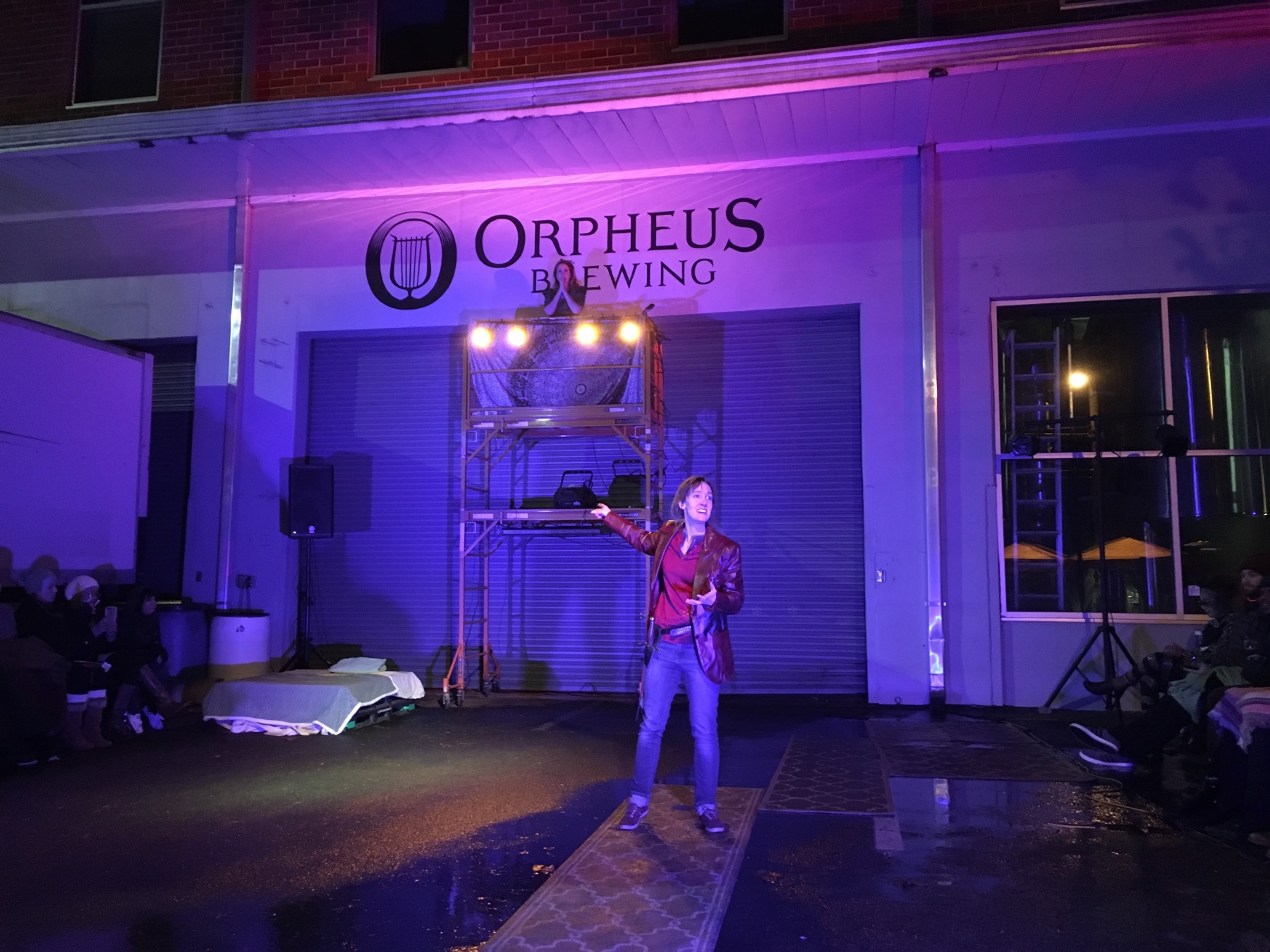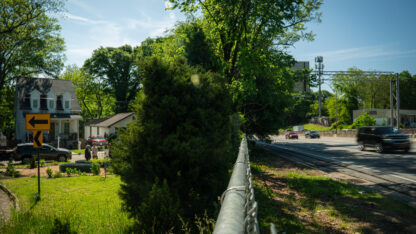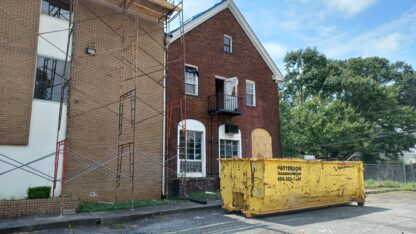Shakespeare On Draught Taps Into Energy Of Unpreparedness

Actors Bekah Medford and April Singley as Juliet and Romeo.
Myke Johns / WABE
There was still some ice and snow on the ground when a lively audience gathered around heaters and under blankets at Orpheus Brewing near Piedmont Park. They were there to take in an evening of Shakespeare.
In front of them, the cast ran through some fight and dance choreography in the brewery’s driveway-turned-stage, and, just before showtime, the audience was split in two.
“If you are blue, you are Capulets!” company member Madison Hatfield called to the side of the audience I was sitting in. We’d all found glow necklaces left on our seats. The other wing of the crowd got red necklaces. As they cheered for the Montagues, our side enthusiastically booed.
As the audience was encouraged to turn on each other and the actors onstage, it became apparent that the unorthodox venue made for a setting equal to the unconventional interpretation of “Romeo and Juliet” that was about to unfold. This was driven home by the curtain speech.
“We are delightfully under-rehearsed!” stage captain O’Neil Delapenha explained. “We have had like one full run-through yesterday and a couple of other times, we’ve met to talk about fights. That’s about it. So if at any point during the night an actor calls ‘line,’ you all take a drink!” At this, the already hyped-up crowd cheers.
It’s not often that a theater company encourages the audience to revel in their mistakes, but that’s all part of the show for Shakespeare on Draught.
“Sure there’s an element of ‘I wanna see this go south,’” Hatfield says. Hatfield is a cabinet member of the company and was playing the role of the nurse that night. “Cause watching people fail is really fun, and we do fail a thousand times throughout the show, but we fail with such confidence and such poise that it becomes like a very contained car wreck and nobody dies.”
Given that description, you might expect the play to be a bumbling mess. Happily, that wasn’t the case. I could probably count on one hand the number of times actors called for a line, each time greeted by cheers and the raising of glasses.
Atlanta has no shortage of the Bard, from the company at the Tavern that bears his name to productions all around town producing, interpreting and remixing his classic works. Shakespeare on Draught was celebrating its first anniversary with this performance. Following in the footsteps of companies like Chicago’s Backroom Shakespeare Project, On Draught got its start in the tiny confines of 97 Estoria in Cabbagetown with a performance of “Twelfth Night.”
“I started this company basically just corralling my super-talented friends, convincing them that this is gonna be a great idea!” Elizabeth Ann Miller says. “Like, it’s gonna be super great! Let’s not rehearse a Shakespeare play and do it in a bar! It’s gonna turn out wonderfully!”
Hatfield and Delapenha, who is another of the company’s cabinet members, were both in the cast that night.
“It’s not as high-brow as some other Shakespeare is,” Delapenha says. “We try to do it as Shakespeare intended his work to be received. What we mean by that is we connect with the audience, we say the words like they’re everyday common text.”
As actor April Singley, playing Romeo, flirted her way through the balcony scene opposite Bekah Medford’s Juliet, she peppered her performance with ad-libs.
“With love’s light wings did I o’erperch these walls,” she called to Medford, perched atop a scaffold that doubled as a lighting rig. “You saw,” she says, turning to the audience, “it was really high!”
I can practically hear the many Shakespearean actors, enthusiasts and scholars across Atlanta crying sacrilege at the idea of playing fast and loose with the text. Hatfield doesn’t see it that way.
“For me, it’s a way of honoring this man, Shakespeare, who is dead but, I think, would totally like this,” she explains. “And as an artist, it’s a way of exploring some really dense text that requires some parsing apart and making it as accessible as possible for my friends and family who are not also actors.”
“That’s the greatest praise I think that any of us get,” Hatfield asserts, “when people come up to us and say, ‘That’s the first time I ever understood Shakespeare, ever.’”
So On Draught’s aim is to strip as much pretention as they can from the production by adhering to a single rehearsal, the lack of a roof or a stage, encouraging heckling, basically, and finally, the company also does away with another convention of theater: multiple shows. The audience and the actors get one shot at the performance, and then it’s over. I ask Miller, why all these limitations?
“That’s actually the legend of Shakespeare’s original troupe,” she tells me. “They had two rehearsals: one to choreograph the fights, one to choreograph the dances. They weren’t given everyone else’s lines, they just got their cue lines. And then they went in front of a bunch of thieves and pickpockets and really drunk people and grabbed onto the wriggling spine of Shakespeare’s text and tried to tell the truth.”
“We’re trying to tap back into that original energy,” Miller says.
Having a single performance feeds into that energy. Having only one chance at the performance encourages bold risks, Miller says.
“The fun thing,” Delapenha laughs, “is there’s no one that can hold me accountable for next time. And if it fails, it fails, and if not, it’s glorious.”
Risking failure for glory is a test for any artist. That one night, sitting in the December cold outside a brewery, the audience of a couple hundred cheered on their respective houses, oohed and ahhed as their star-crossed lovers fell, and, at the end, leapt to their feet.





